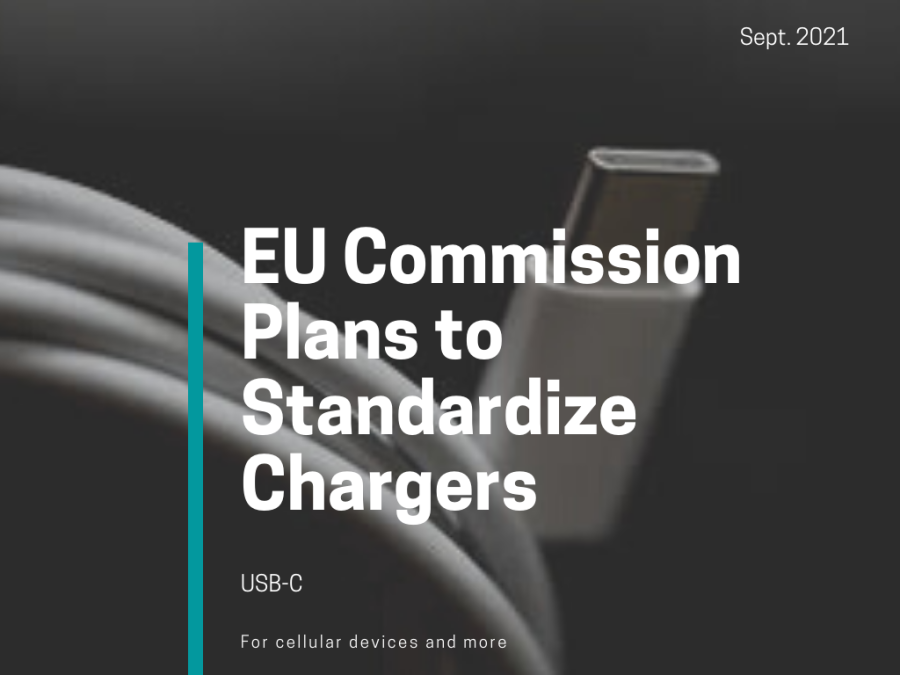EU Plans to Standardize Chargers
Oct 21, 2021
On Sept. 23, the European Commission announced a plan to standardize chargers in the European Union. They released a statement on their website titled “Pulling the plug on consumer frustration and e-waste: Commission proposes a common charger for electronic devices.”
“Today, the Commission takes an important step against e-waste and consumer inconvenience, caused by the prevalence of different, incompatible chargers for electronic devices,” the statement says, “The Commission is now putting forward legislation to establish a common charging solution for all relevant devices.”
The standard charger will be the USB-C. “The European Commission, the bloc’s executive arm, proposed legislation that would mandate USB-C cables for charging, technology that many device makers have already adopted,” writes CBS News.
The main reasons for this proposed plan is to reduce waste and inconvenience from people owning several chargers for all their devices. “[European Union officials and lawmakers] have argued that fewer wires would be more convenient for users and better for the environment,” the New York Times writes, “as mobile phone chargers are responsible for 11,000 tons of electronic waste per year across the bloc, according to estimates by the European Commission.”
As for inconvenience, NPR reports, “European consumers were frustrated long enough about incompatible chargers piling up in their drawers,” Margrethe Vestager, executive vice-president of A Europe Fit for the Digital Age, said in a statement.”
Furthermore, “EU citizens own three mobile phone chargers on average, according to the European Commission, the bloc’s executive arm,” CNN says, “[b]ut 38% of consumers have not been able to charge their phone on at least one occasion because they didn’t have the correct charger to hand.”
Though the EU Commission has been discussing the standardization of chargers for a while, the proposed legislation may take years to go into effect. According to the New York Times, “European Union officials and lawmakers at the European Parliament have been advocating a common charger since 2009.” The proposed legislation is a big step forward to achieving the Commission’s goal. However, “The new legislation is likely to come into effect in 2024,” says the New York Times, “because it first needs to be approved by the European Parliament and then adopted by manufacturers.”
Once the legislation is approved, most devices will have to have a USB-C port. “[I]f the legislation is enacted as proposed by the European Commission, it will become illegal to sell an electronic device without a USB-C charging port,” says the New York Times. The proposal does include Iphones, but many other devices will also be affected.
“Under the proposal, USB-C would become the standard charging port for all smartphones, tablets, cameras, headphones, portable speakers and handheld video game consoles,” says NPR.
If or when the legislation takes effect, Apple will be greatly affected. “The move is a setback for Apple (AAPL), which uses its own “Lightning” port on the iPhone,” CNN writes, ”[w]hile the new rules are years away from coming into force, Apple could be compelled to make changes to its signature product.” This could cost Apple a lot of money.
The New York Times reports that, “Daniel Ives, the managing director of equity research at Wedbush Securities, called the E.U. proposal a “gut punch to Apple” that would force the company to adapt its design and supply chain, and cost up to $1 billion.”
In response to the EU Commission’s proposition, Apple has argued that standardizing chargers would hinder innovation and actually increase waste. “Apple, whose iPhones are equipped with a different port, has long opposed the plan, arguing that it would stifle innovation and lead to more electronic waste as all current chargers that are not USB-C would become obsolete,” says New York Times.
According to the Guardian, “In a statement [Apple] said: “We remain concerned that strict regulation mandating just one type of connector stifles innovation rather than encouraging it, which in turn will harm consumers in Europe and around the world.”
Despite Apple’s concern for its consumers, there still appear to be many benefits to a standard charger. CBS says, “The new rules also call for standardizing fast-charging technology and giving consumers the right to choose whether to buy new devices with or without a charger, which the EU estimates will save consumers the equivalent of about $300 million a year.” The EU Commission has responded to Apple on these points as well. “If Apple wants to continue to have their own plug, they will have the ability to do it. It’s not against innovation, it’s just to make the lives of our fellow citizens a little bit more easy,” Breton said at a press briefing in Brussels, adding that device makers could still put two different ports on their phones if they want,” reports CBS.
In addition, the Guardian writes, “The commission vice-president, Margrethe Vestager, defended the plan. She said: “We gave industry plenty of time to come up with their own solutions, now time is ripe for legislative action for a common charger. This is an important win for our consumers and environment and in line with our green and digital ambitions.”
The EU plan allows for two years for companies to switch to USB-C ports. “If the European Parliament and the European Council adopt the proposal, it would take full effect after a 24-month transition period to give the technology industry time to prepare for the change,” says NPR, “Apple says it is concerned about the proposed length of the transition.” This would only apply to devices sold in EU states; however, Apple is likely to change the ports for all its devices sold worldwide.
CBS writes, “Companies will get two years to adapt to the new rules once they take effect. The rules would apply only to electronics sold in the European single market’s 30 countries, but, like the EU’s strict privacy regulations, they could end up becoming a de facto standard for the U.S. and the rest of the world.”










